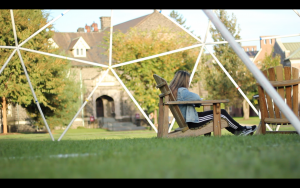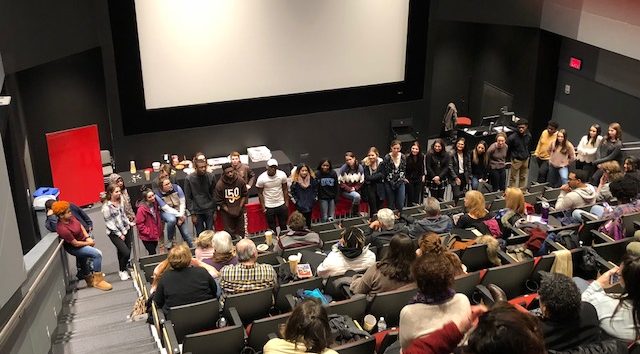https://drive.google.com/a/lafayette.edu/file/d/13WdGP9d4xgcJl0HYvW_YJ_BtR2jXDc4L/view?usp=sharing
Author Archives: Andrea Bonilla
Not Like You

DACA students are working towards a college degree while constantly fearing deportation.
Louise Frazier Interview Reflection
While filming and editing the interview with Louise Frazier I was able to utilize many of the things I read about. During the interview I had a small inconvenience, my mic ran out of battery, but an extra battery pack saved the day. For a moment I thought I would have to go back to the equipment room and reschedule the interview. I learned that it’s key to carry extra batteries for all of your equipment. While editing, I was glad I got room sound because I was able to use it for the “breathing room” at 2:24. I also noticed that I should’ve had broll of Louis with her students but she works downtown so I would have had to ask her to go up the hill, and I thought about that when it was too late. However, I tried to compensate for that by using pictures of her with students. At the beginning of this assignment I thought it was going to be more about Louise’s job, but throughout the interview, I noticed how she talked more about the stuff that she does outside her job. That’s what truly brings her happiness. She loves helping/mentoring her students and she always makes sure they’re okay. Like other filmmakers, who have come in to talk this semester, have mentioned, “you start shooting for one film and end up with another film… The film finds you.”The fine cut was centered more around her interaction with students that than just her job. I was happy with the final outcome and it turned out a million times better than my first interview in making media 1. This interview was better paced, more focused and it hooked the viewer with the intro, 10 seconds into the video the viewer knew that Louis was more than her job description.
Tickling Giants (Taksler, 2016) Reflection
Tickling Giants (Taksler, 2016) was probably one of my favorite movies we watched this semester. I loved the style of the movie with the animations and editing of the sound and text. Dr. Bassem Youssef was charismatic right from the start, I wanted to know more. I never knew this was going on and the movie portrayed how important social media has become. It’s crazy to think that the president of Egypt felt threatened by a show. I loved the quote, “If your regime can’t take a joke, then it’s not a regime.” Dr. Bassem Youssef was risking his life, and family, every week by making a couple of jokes and trying to educate people. What I loved about him is how he always kept a smile on his face. After reading a comment telling him to kill himself he still smiled and brushed it off. To endure that type of mental and emotional pressure must not have been easy, but he handled it well. I loved how entertaining and educational this movie was. In the movie it’s mentioned, “comedy doesn’t change anything, comedy changes people, people change things.” Just a simple joke and show can have so much power. At one point, I felt like Dr. Youssef was more powerful than the Egyptian president. After watching the film not only did I feel like doing more research on Dr. Bassem Youssef but watching more of Taksler’s films.
Newtown (Snyder, 2016) Reflection
I had a knot in my throat throughout the whole movie. I couldn’t believe this happened, and I still can’t at times. It’s something that I had forgotten about but it’s been on my mind lately after watching it. The home videos made everything more painful because it showed how these kids were before, and that they were more than a horrific news story. The use of the black screen to cut some parts of the testimonies was interesting to me. On one hand, I wanted to know more details about what had happened. On the other hand, I could see why it wasn’t necessary to include all the graphic details of how the kids looked after being shot several times.
I was impressed by Kim Snyder’s courage to even embark on this journey. I think it’s a challenge that many other filmmakers wouldn’t have taken. There are so many ethical choices to make, that just thinking about starting such a project would’ve paralyzed anybody. The fact that she got started and made the right ethical choices accordingly shows the talented filmmaker she is.
I had never thought about all these mass gun shootings as a public health issue but when she mentioned it, it all made sense. It had always been a possibility for people to go around shooting people, but it wasn’t an epidemic like it’s now. It’s something so common that like she mentioned we have become desensitized to it. I honestly can’t read the news sometimes, because of my own mental health. I know that if I read the news I would have a mental break down every day. We’ve had to become desensitized to all these mass gun shootings and other disasters. If there has been a mass gun shooting of YOUNG KIDS in school and our gun control policies haven’t changed, there’s nothing that will make them change. It breaks my heart, but it’s the truth. I’m glad she brought some light to the pain these families felt. She showed us another side of the story and gave them an opportunity to share their voices. Like Snyder mentioned by watching films like this, and making them ourselves, we can only hope we are bringing about some change.
More Than the Job Description
Louise Fraizer fine cut interview video
https://drive.google.com/a/lafayette.edu/file/d/1bJOTD3L-nixMdPNY6GGt6a8NaiEkzIXB/view?usp=sharing
DACA STATS
- On average, DACA recipients entered the US at the age of six-and-a-half.
- Recipients of DACA must have proof they were brought to the US before the age of 16, were under 31 years of age when the program was launched, and be at least 15 years old when applying to DACA.
- Congress has 4 months to come to a political solution before DACA officially ends.
- Through March, 1,586,657 people nationally have been approved for the program, and of those, 799,077 have been approved for renewals, according to U.S. Citizenship and Immigration Services.
- 91% of DACA recipients have jobs.
ROUGH CUT JULIUS INTERVIEW- DACA FILM
https://drive.google.com/a/lafayette.edu/file/d/1IY33UCSnqEL-YtK7qVe7kUrZy6ssuQet/view?usp=sharing
Interview – Louise Fraizer DRAFT
https://drive.google.com/a/lafayette.edu/file/d/1cEB0kWjRXOCQd2WTTgW-LazRqW1GC-MX/view?usp=sharing
Night and Fog (Resnais 1955)
The Holocaust is something that can never be truly depicted by words or film, in Night and Fog (Resnais, 1955) the narrator says, ”No shot can restore their true dimensions” and Elie Wiesel says, “How can one recount when- by the scale and weight of its horror- the event defies language?.. The essential will remain unsaid, eradicated, buried in the ash that covers this story…Does there exist another way, another language, to say what is unsayable?” (page 209) I was blown away by his words and the how the film acknowledges that the horror of this event can’t be shown. However, Resnais still makes you uncomfortable while watching his film.
The film made me feel uncomfortable with the pan of the endless piles of bodies and the buildings and equipment used for torture. I was glad it made me uncomfortable because I knew it was challenging me and making me see something I wouldn’t have seen otherwise. Flitterman-Lewis talks about how this, ”allows him to represent the unrepresentable, to image and unspeakable terror, and to simultaneously produce both anxiety and reflection on part of the viewer.” (page 205) The ending was thought-provoking, to say the least, with the question of “who is responsible?” followed by a series of questions. It made me realize how similar stuff is happening like in Rohingya. What are we doing to stop this genocide? Turning a blind eye.
Every time I read or watch something about the Holocaust I learn something new. For example, I didn’t know about how they used, “every bit of “waste”… ashes become fertilizer, bodies become soap, hair becomes textiles, and skin becomes paper for drawing.” (page 206) When I first heard in Night and Fog ,” the skin gets used for” and they showed the paper I couldn’t believe it. I didn’t fully realize the truth until I read it in text and I was shocked. Once again, the Holocaust is something that I will never know enough about and I’m glad films like this keep bringing awareness to the experience of it. Continue reading
